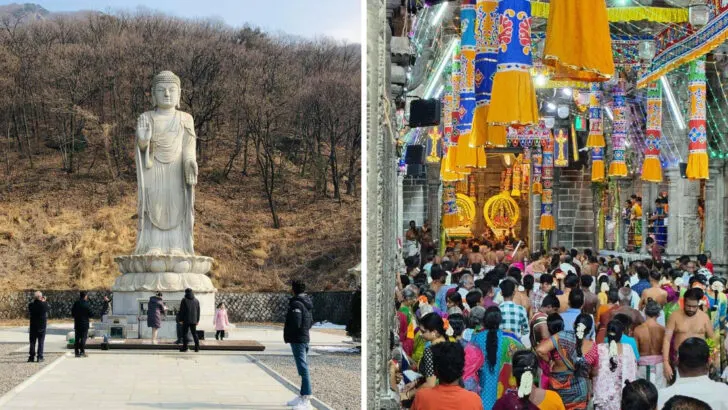In a world where modernity often takes center stage, there are places where tradition reigns supreme.
These locations demand a deep respect for cultural practices, religious beliefs, and age-old customs. Ignoring these traditions is not just frowned upon; it can lead to social faux pas or even legal consequences.
Visitors must tread carefully and embrace the local customs to truly appreciate the rich tapestry of these cultures. Here, we explore 10 places where respecting tradition is absolutely essential.
Japan – Tea Ceremonies & Social Etiquette
Imagine entering a world where every movement is a dance of grace and precision. In Japan, tea ceremonies are more than just sipping matcha; they are a meditation in motion.
The meticulous etiquette reflects centuries of cultural refinement. Bowing, a simple yet profound gesture, carries the weight of respect. Removing shoes before stepping onto tatami floors is a sign of reverence. These customs encapsulate Japan’s commitment to tradition.
Whether in a tranquil tearoom or a bustling city, observing these rituals is non-negotiable. They offer a window into the soul of a nation that cherishes its past.
Saudi Arabia – Religious and Social Codes
In the heart of the Middle East lies a realm where ancient traditions dictate daily life. Saudi Arabia, the cradle of Islam, demands unwavering respect for its religious codes.
Five times a day, the call to prayer echoes through the land, a reminder of faith’s omnipresence. Dress codes, with men in thobes and women in abayas, reflect cultural values. These norms extend beyond fashion; they are woven into the societal fabric.
Missteps can lead to serious repercussions. Here, tradition isn’t just respected—it’s revered. The kingdom stands as a testament to unwavering cultural fidelity.
Bhutan – The Gross National Happiness Philosophy
Nestled in the Himalayas, Bhutan is a nation guided by the unique philosophy of Gross National Happiness. Here, tradition and culture are not just preserved; they are celebrated.
The national dress, gho for men and kira for women, is mandatory in schools and government offices. Traditional architecture, with its intricate woodwork, adorns the landscape. Buddhism, the spiritual backbone, influences every aspect of life.
This commitment to heritage is part of a broader policy to nurture happiness and well-being. Bhutan offers a harmonious blend of past and present, where tradition is a path to fulfillment.
India – Temple Protocols and Festive Rituals
Within India’s rich tapestry, temples stand as pillars of tradition. Here, rituals aren’t merely performed; they are lived. Removing shoes before entering a sacred space is an act of humility.
Festivals like Diwali illuminate the streets with colors, sounds, and devotion. Yet, there is a quiet reverence in the air, reminding all of centuries-old protocols. In these hallowed grounds, behavior aligns with ancient traditions, and photography is often forbidden.
This respect for ritual is woven into the cultural fabric of India, where every act of worship is a testament to deep-seated beliefs.
Greece – Orthodox Religious Observances
Amidst the sun-kissed landscapes of Greece, Orthodox Christianity is a cornerstone of identity. Here, religious observance is more than ritual; it is life.
Easter, a time of profound spiritual reflection, is marked by solemn processions and vibrant celebrations. Churches, adorned with icons, become sanctuaries of faith. Within these sacred walls, even a whisper of disrespect is unacceptable.
The rhythm of life is intertwined with the church calendar, guiding communities through the year. In Greece, traditions are not just remembered; they are passionately lived, preserving a legacy of devotion and unity.
Morocco – Medina Manners and Islamic Norms
Step into a Moroccan medina, and you enter a world where time-honored customs prevail. Amid narrow alleyways, the scents of spices and the sounds of bargaining fill the air.
Modesty in dress and demeanor reflects a deep respect for Islamic traditions. During Ramadan, the medina transforms, becoming a place of reflection and community. Visitors must tread lightly, dressing conservatively and observing local customs.
Here, tradition is not just preserved; it thrives. The medina is a living testament to Morocco’s rich cultural heritage, where every corner tells a story of faith and history.
South Korea – Confucian Hierarchy & Ancestor Worship
In South Korea, the echoes of Confucian values resonate through daily life. Respect for elders is woven into the social fabric, a guiding principle upheld with pride. Ritualized greetings and gestures are expressions of this deep-seated respect.
Ancestor memorial rites, known as jesa, are solemn occasions where family bonds are honored. Within a hanok, the traditional Korean house, these ceremonies connect past and present, honoring generations.
In this society, tradition is not just remembered; it is revered. South Korea offers a glimpse into a world where hierarchy and heritage shape the soul of a nation.
Ethiopia – Tribal Customs and Oral Traditions
In Ethiopia’s Omo Valley, tradition takes center stage. Here, tribal customs are sacrosanct, passed down through generations. The vibrant attire, adorned with beads and feathers, tells stories of identity and heritage.
Rituals, whether in dance or in conflict resolution, are deeply rooted in oral tradition. Outsiders must tread carefully, for disrespect can fracture community ties. Each tribe offers a unique narrative, yet all share a commitment to preserving their way of life.
In this cradle of humanity, tradition is not just a relic of the past; it is a living, breathing testament to resilience.
Bali (Indonesia) – Balinese Hinduism and Ceremonial Life
In Bali, spirituality weaves through everyday life, creating a sacred tapestry of rituals and traditions. Daily offerings, known as “canang sari,” are small yet profound acts of devotion.
Temple festivals, with their vibrant processions and gamelan music, invite participation with a spirit of reverence. The island’s unique form of Hinduism blends with ancient customs, creating a culture where tradition thrives.
Visitors, donning sarongs and sashes, must approach these ceremonies with respect. Here, the past is a living presence, guiding the present and illuminating the spiritual path of the island’s people.
Vatican City – Papal Protocol and Religious Reverence
At the heart of Catholicism, Vatican City is a beacon of religious reverence. Within its hallowed walls, tradition is a solemn duty.
Papal audiences draw the faithful, where modest attire and quiet devotion are expected. The Sistine Chapel, with its breathtaking frescoes, demands silence and reflection. Every gesture and word must align with the sacred atmosphere.
Here, respect is not just expected; it is imperative. The Vatican stands as a testament to the profound impact of tradition on faith. In this spiritual epicenter, the past is a guiding light, shaping the journey of millions.

